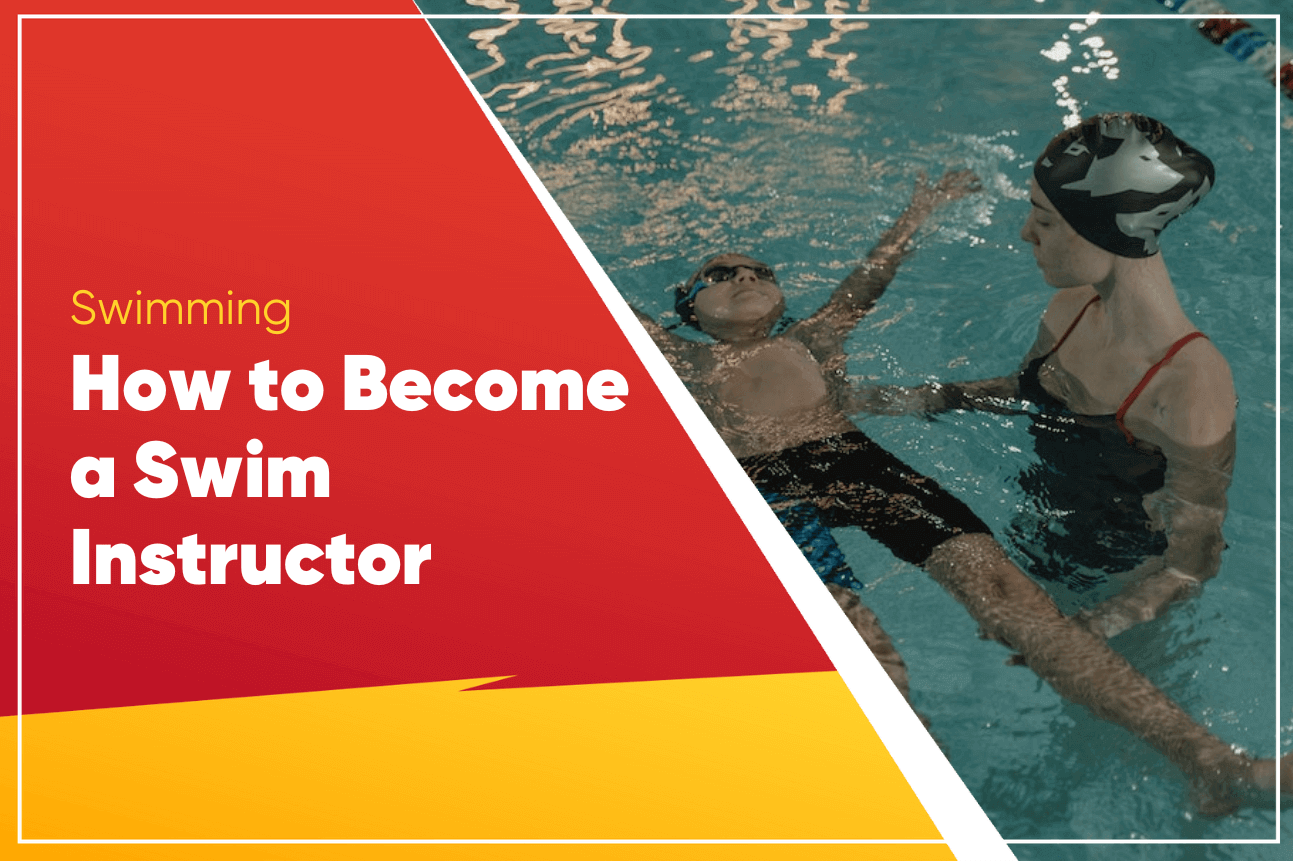How to Become a Swim Instructor

Working as a swim instructor is one of the most rewarding jobs. Teaching children and adults the art of swimming gives them the confidence to enjoy the water whenever they want. The job is perfect for those who enjoy teaching and spending time in the water while maintaining the safety of all students.
How do you become a swim instructor? Several courses are available for interested candidates to get the education and certification required to be a swim instructor. Even with certification, many instructors work as apprentices or assistants before they begin teaching on their own. Some instructors work for pool facilities or swim lesson companies, but others choose to offer private lessons.
What is a Swim Instructor?
A swim instructor is someone who teaches swimming. They could work at a public pool offering lessons to all ages, offer private infant swim lessons, or work with athletes.
Swim Instructor Specializations
While some instructors work with a variety of clients in many settings, most swim instructors work with a specific age group of clientele.
Infant Swim Instructors
For parents who have a pool or are near water frequently, infant swim lessons can relieve a lot of stress. At this age, instructors focus almost entirely on the safety portion of water skills with very little swimming.
There are a few different training methods used to teach infants how to respond in water. Overall, the goal is for the infant to learn how to get themselves to the surface of the water and float on their back.
Most infant swim instructors work out of public pools or do private lessons at homes. Lessons are 10-15 minutes long and happen almost daily for a few weeks. Once the infant is proficient in floating on their back, the behavior can be maintained with less frequent lessons.
Child Swim Instructors
Toddlers and children love to swim in the pool. Unfortunately, their enthusiasm usually outweighs their swimming abilities. Swim instructors that work with children balance safety and skills when teaching.
Depending on the age of the child, they may be learning basic swimming skills or practicing different strokes.
Since each child will be at a different ability level, swim instructors work hard to personalize training plans. Some instructors will offer classes based on the age or skill level of the children, but the classes are kept to a small group for safety.
Adult Swim Instructors
Like working with children, instructors who work with adults can have clients with a variety of skill levels. Some adults never learned to swim as a child and others are looking to improve their techniques.
Public pools and fitness centers will hire swim instructors to lead adults-only swim classes.
Sometimes, nursing homes or community centers will have swim instructors lead classes for the elderly. Typically, these classes focus more on movements and comfort in the water as opposed to swimming.
Competitive Swim Instructors
Many competitive swim instructors are prior athletes who love the sport of swimming. Sometimes called swim coaches, these instructors don’t always follow the traditional route to teaching. Since many were already involved in the sport of swimming, coaching is a natural progression for them.
Swim coaches may not have completed the traditional certification courses that other swim instructors take. However, these courses can still be beneficial for maintaining safety in the water, even with experienced athletes.
When working with amateur or professional swimmers, instructors are working to increase skill and speed. Oftentimes, the athletes are well-versed in the strokes and skills of competitive swimming. Instructors will work with athletes to improve their form, speed, and efficiency in the water.
Responsibilities of a Swim Instructor
Before learning exactly how to become a swim instructor, it's best to learn the responsibilities of one to see if it's for you. The responsibilities of a swim instructor can vary based on how their business is set up. Private instructors typically cover all the responsibilities of the job, including booking clients and maintaining safety. However, swim instructors at a fitness center may just focus on the lessons since the facility books the appointments and lifeguards maintain safety in the pool.
Safety
Safety is the number one priority for swim instructors. Clients, whether they are children or adults, can be at a high risk of drowning if they are not strong swimmers. Since the clients are working with an instructor to improve their skills, the assumption can be made that all clients are at risk of drowning.
Teaching
In addition to actually teaching the lessons, swim instructors are expected to prepare lesson plans for each class or session. The lesson plans should be personalized to the skill level of the client or class being taught.
Teaching swim lessons can be a difficult job. Toddlers might be scared in the water. Children can be distracted easily. The ability to make lessons fun and engaging can be just as important as having the knowledge to teach swimming skills.
Communication
Private instructors will be working with clients and booking lessons. All instructors will be working with their clients (and parents of the children). Sometimes that means giving “homework” or directions to the parents when their child is in the pool. Honest, direct, and polite communication should be used at all times with clients and parents.
When it comes to infant swim lessons, the sessions can be hard to watch for parents. Many infants cry during their first lessons. Parents should always be present during the sessions, but instructors should take the time to explain everything to the parents. Since the goal of infant swim lessons is for the babies to get themselves into a safe location if they accidentally fall in the water, parents need to understand that it is okay for their children to be temporarily upset. The babies will eventually become comfortable in the water and be proficient in floating on their backs.
Facility Maintenance
When working at a pool or fitness center, swim instructors may also work as lifeguards or custodial around the pool. This can help the instructor reach full-time hours if there are not enough lessons available. Since swim instructors work around pools a lot, they may also be able to help with pump maintenance and water quality in the pool systems.
Certifications
There are several swim instructor certifications available to become a swim instructor. Most courses and certifications cover similar information: safety in the water, basic swimming skills, and how to teach. If you get a job with a larger swim instruction company, they may have their own course for you to take before working on your own.
Usually, the requirements to participate in a swim instruction course are being 16 (or 18) years old and being a proficient swimmer. Some helpful skills include teaching experience, prior experience with children, and good physical strength.
American Red Cross Training
The most common swim instructor training course is offered by the American Red Cross. Its Water Safety Instructor Course covers everything you need to become a proficient swim instructor. All aspects of safety are covered in addition to the basics of teaching swimming.
Other Courses
In addition to the Red Cross, there are several other agencies that offer swim instructor and safety courses. YMCA, Swim Lessons University, and The Aquatic Training Academy are some organizations offering popular courses.
When looking for a swim instructor course or certification, make sure you choose an organization that is well-known and respected. The course should cover everything you need to know to be a swim instructor. This includes safety, swimming basics, principles of teaching, and other helpful information.
In addition to the instructor education, you should also get CPR certified. Water emergencies can happen to even experienced swimmers. It is imperative that lifesaving care be given immediately should any emergencies occur during your classes.
Swim Instructor Salary
The salary range for swim instructors varies widely. This is mostly due to location and cost of living. Additionally, an instructor working for a large company will make less than a private instructor who works by themselves.
If an instructor works for a swim school or organization, they will be working for a set rate. Usually the rate is per class or per house. On average, swim instructors make $12 per hour.
Operating as a single private swim instructor can be a more lucrative business. Since a single person does all the work, they get to keep all the profits. Private swim lessons can cost $20-$60 per class. Infant swim lessons tend to last only 10-15 minutes, so a private swim instructor can complete many sessions in one day.
How to Find a Swim Instructor Job
The first place to look for swim instructor jobs is local swim schools, public pools, and fitness centers. The advantage of working for a swim school is that many offer a certification course through on the job training. You can start working while you’re still completing your course. Public pools and fitness centers will most likely require you to already have a swim instructor certification to work at their facility.
Online job boards are the most comprehensive resource when searching for any job. Just include swim as one of the keywords for your desired location to find jobs. You can also post your resume on a job board so businesses can reach out to you if they have a swim instructor position available.
If you are looking to operate as a private swim instructor, you will just need to start advertising your services. Community Facebook groups, local businesses, and public pools can be great places to get the word out. Make sure that you have up-to-date social media pages and a website because most marketing is done online these days.
Final Thoughts
Simply put, you just need to complete a swim instructor course or certification to begin working as a swim instructor. However, prior swimming experience and a passion for teaching can make your journey much easier. Once you are ready to begin teaching, you can work with infants, children, or adults. It is not the hardest job in the world, but being a swim instructor is one of the most rewarding.
Gym management software that frees up your time and helps you grow.
Simplified billing, enrollment, student management, and marketing features that help you grow your gym or martial arts school.





